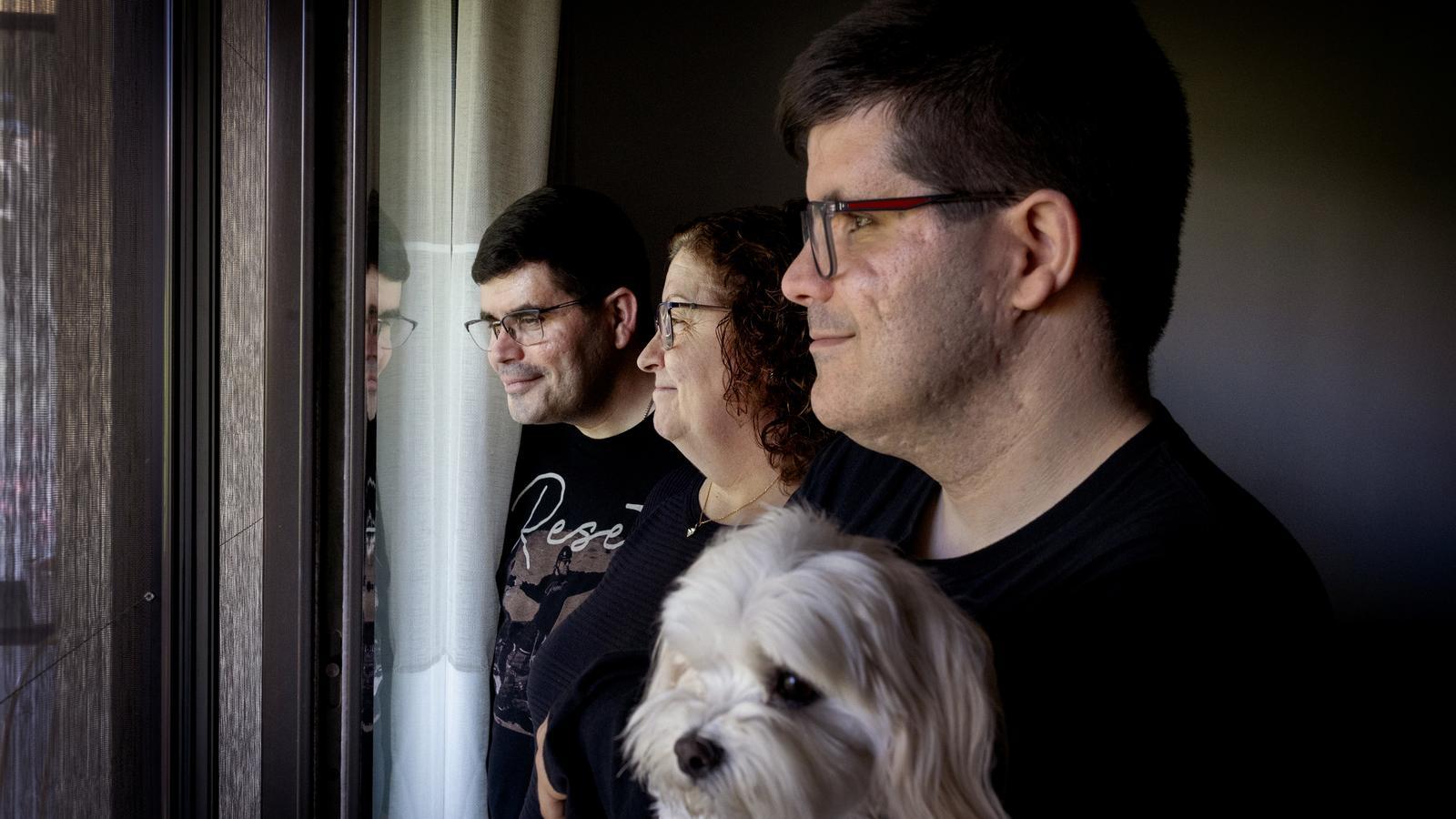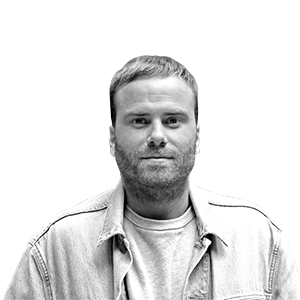Elsa Cabanas: "My son said to me, 'Will you die like Dad?' And I got out of bed."
Widowed mother who has been caring for two children with intellectual disabilities alone for 25 years


BarcelonaElsa Cabanas (Barcelona, 1961) has been raising her two intellectually disabled sons alone for 25 years, ever since her husband died of cancer. Dani (Barcelona, 1980) and Ángel Naranjo (Barcelona, 1988), all three of them, arrived in the Sant Andreu neighborhood four years ago from Les Roquetes. Despite the obstacles life has put in their way, they are filled with smiles and positivity during the conversation with ARA, which takes place in their home. Also present is Luna, a dog who will turn four in July. The day of the interview was especially joyful for Ángel, who drove a forklift for the first time.
Was it a coincidence that they were both born with intellectual disabilities, or was there a history of it in their family?
— My husband had four siblings, and the youngest had an intellectual disability. But before having my children, we thought it was because her mother had her so late, at 50. Then Dani was born, with an intellectual disability, and we didn't really associate it with that either. But I thought about it a lot before having another. That's why they're seven and a half years apart. They ran all kinds of tests on me and told me there was no reason for another child to be born with a disability and that Dani would be fine with having a sibling. But Ángel was also born with a disability. It runs in the family, congenital. It is what it is.
She's been caring for Dani and Ángel alone for 25 years. How old were you when your husband died?
— At 39. Dani was almost 19 years old and Ángel, 11.
What were the months after his death like?
— Very bad, I fell into a depression. I was taking pills for over a year until one day Ángel, who always saw me in bed, came to me and said, "Will you die like Dad?" That was it; I got out of bed. Until then, I would get up to take them to school or the workshop and go back to bed until they came out. That question made me react. I changed my mindset.
Did you ask for professional help?
— Ángel started seeing a psychologist, and then he was also referred to a psychiatrist because his father's death affected him deeply. Until one day the psychiatrist told me: "He doesn't need a psychiatrist, you need one." I went to the same psychiatrist, but I dropped out because it wasn't working for me. He told me a theory that I wasn't good at putting into practice. Sometimes I went quietly, and I always came out crying. For example, he told me I should take my husband's clothes out of the closet or throw away his ashes. I wasn't ready for that. In fact, I still have my husband's ashes today. Everyone grieves as best they can.
Were you working at that time?
— I had worked as a cook at Sant Pau Hospital and stopped working to care for my husband, because when they discovered his cancer it was June and they told him he wouldn't make it to Christmas. He managed to make it to Christmas the following year. After that, I couldn't go back to work. I had to take care of my children and take them to special needs school, the workshop, and the psychologist. My mother was already old, and I had no one to help me; I had to do it alone.
And where did the money come from?
— From the widow's pension and from my parents, especially from my mother, because my father also died young.
Did your children not have any help, despite their disability?
— They started getting it when I was 18, but they only received family protection benefits, which were in my name. Now they get more support: they get dependency and orphan benefits from their father. I had a lot of expenses back then. Ángel's psychologist after my husband died cost me 60,000 pesetas [about 360 euros] a month. There was a two-year waiting list with Social Security, and he needed a psychologist immediately.
But their lives have also had times of happiness, haven't they?
— Yes, we haven't lacked for anything. They've been able to do more or less what they wanted, and we've traveled. We've tried to live as normal a life as possible. Today, for example, Ángel went to take a wheelbarrow driving course [Angel, amused, shows a video recorded on his phone in which he is shown doing a practical training]. He was happier because he had driven! He works in the food industry, making salts and chocolate. And he plays soccer in a joint project between the Taller Escola Barcelona (TEB) and the Sant Andreu University. Dani, on the other hand, doesn't like sports. He works as a gardener for Barcelona City Council and takes care of us.
And have you returned to work?
— I haven't been able to. If I worked, who would take care of them? They can't read or write. Now they know how to get to work because it's their daily routine, but if they change places, they don't know how to get there. For example, today Ángel took a forklift driving course in Cornellà. Who took him? We were already there at seven in the morning.
They had to get up early.
— Every day. We get up at four in the morning and leave home at ten to five.
Do you have contact with other families in a similar situation?
— I don't know anyone with two children with intellectual disabilities, but I remain friends with the people who have helped me. For example, after this interview, I'm meeting for coffee with the psychologist Ángel had when he was at school 17 years ago. And I'm in contact with many parents. We have a WhatsApp group, and if we hear about any new help, we keep each other updated on the topic.
Are you happy with public aid?
— Now it's heaven compared to how things were before. Back then, I had to take the bus four times a day to take them to school, and we didn't have the free pink card: I spent a fortune on the bus every day. Plus, the special education school wasn't subsidized. I wouldn't have been able to afford it if my parents hadn't helped me. Now, public agencies help you more, but you only receive child support if your child has at least 65% intellectual disability. Dani is diagnosed with 65%, and Ángel, 66%.
Do you think they should receive more support from society?
— Now I don't miss anything. I used to, but now I don't. They're accepted and not discriminated against. They've never been disrespected on the street. On the contrary [Dani and Ángel nod in agreement with their mother's words].
And what about financial aid?
— If they stayed as they are right now, it would be perfect. The problem is that when they retire, they'll have to choose between retirement [they can retire at age 52], which will bring them very little because Dani earns the minimum wage as a municipal gardener and Ángel earns 85% of the minimum wage because he has a low-performance contract, or the child I'm supporting and his orphanhood. Both can't happen. When they're older and I'm gone, they'll need help. Someone will have to take care of them. The moment they need the money most is when they'll earn the least.
And what is the solution?
— Now we must plan for the future and save. The only solution is to save now. They, who are still awaiting assessment but likely have third-degree dependency, will have to go to a nursing home because with this level of dependency, the law currently states they cannot live in a sheltered apartment, which is their dream ["It's what I want, to stay here," Dani adds].
What is a normal day in your life like?
— We get up at 4 a.m., have a coffee with milk or a Cola Cao, the two of them go to work, I go shopping, then they come back home for lunch, and on Thursday afternoons Ángel goes to soccer practice. Dani and I often go shopping in the afternoons; he helps me a lot. And every other Saturday, Ángel has a soccer game, and then we all go out to eat together or we meet up with my friend who lives downstairs and also has a son with an intellectual disability. Other days we meet up with friends who are mothers from school and we get together at La Maquinista. A normal life.
